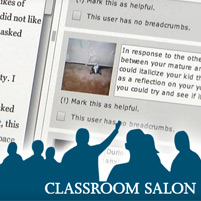Classroom Salon

Educators at Carnegie Mellon University are leveraging the power of social media to create online learning communities.
Their application, Classroom Salon, has been used by thousands of high school and university students this past academic year to share their ideas — about texts, news articles and other reading materials.
They've even used it to share critiques of each others' writings.
The app could potentially help students who are in danger of failing introductory courses or otherwise dropping out of college.
"Sites such as Facebook and Twitter have captured the attention of young people in a way that blogs and online discussion forums have not," said CMU's Ananda Gunawardena.
He added, "With Classroom Salon, we've tried to capture the sense of connectedness that makes social media sites so appealing, but within a framework that allows groups to explore texts deeply."
Classroom Salon was developed in a thesis by Alex Cheek when he was a grad student. Cheek is now a professor at CMU.
Gunawardena, an associate teaching professor in the Computer Science Department, further developed Classroom Salon with CMU's David S. Kaufer, a professor of English.
Using the app, class members can read assigned texts and then annotate them with online editing tools.
These observations can then be shared with the group using the system's novel interactive tools, which can highlight "hot spots" that spark discussion within a document, cluster similar comments, and even identify which comments are most influential.
"Studies show that people working in teams are able to arrive at better and more creative solutions than people working alone, and this is particularly true in reading and writing tasks. However, that collective effort is difficult to achieve in formal education settings," Kaufer said.
"Class time is limited and most online course management systems tend to be driven by the instructor's questions. Classroom Salon, by contrast, makes possible more genuinely student-centered collaborative work."
Kaufer and Gunawardena suggest that at-risk students may benefit the most because Classroom Salon also can easily be used to personalize instruction for specific individuals and groups.
Gunawardena and Kaufer also are exploring the commercial potential of Classroom Salon through CMU's Project Olympus.
Part of CMU's Greenlighting Startups initiative, Project Olympus is a program that bridges the gap between research and the marketplace by providing faculty and students with start-up advice, incubator space and business connections.
The National Science Foundation, Innovation Works and the Heinz Endowments have supported the development of Classroom Salon.
Related Links: Classroom Salon | Greenlighting Startups | Project Olympus | Computer Science Dept | English Dept
